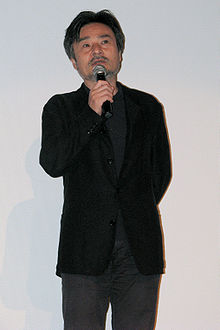Kurosawa Kiyoshi
| Kiyoshi Kurosawa | |
|---|---|
 |
|
| Born |
July 19, 1955 Kobe, Japan |
| Alma mater | Rikkyo University |
| Occupation | Film director, screenwriter, film critic |
| Years active | 1973–present |
Kiyoshi Kurosawa (黒沢 清 Kurosawa Kiyoshi?, born July 19, 1955) is a Japanese film director, screenwriter, film critic and a professor at Tokyo University of the Arts. He is best known for his many contributions to the Japanese horror genre.
Born in Kobe on July 19, 1955, Kiyoshi Kurosawa is not related to director Akira Kurosawa. After studying at Rikkyo University in Tokyo under the guidance of prominent film critic Shigehiko Hasumi, where he began making 8mm films, Kurosawa began directing commercially in the 1980s, working on pink films and low-budget V-Cinema (direct-to-video) productions such as formula yakuza films.
In the early 1990s, Kurosawa won a scholarship to the Sundance Institute and was able to study filmmaking in the United States, although he had been directing for nearly ten years professionally.
Kurosawa first achieved international acclaim with his 1997 crime thriller film Cure. Also that year, he experimented by filming two thrillers back-to-back, Serpent's Path and Eyes of the Spider, both of which shared the same premise (a father taking revenge for his child's murder) and lead actor (Show Aikawa) but spun entirely different stories.
Kurosawa followed up Cure with a semi-sequel in 1999 with Charisma, a detective film starring Koji Yakusho. In 2000, Seance, Kurosawa's adaptation of the novel Seance on a Wet Afternoon by Mark McShane, premiered on Kansai TV. It also starred Yakusho, as well as Jun Fubuki (the two had appeared together in Charisma as well). In 2001, he directed the horror film Pulse. Kurosawa released Bright Future, starring Tadanobu Asano, Joe Odagiri and Tatsuya Fuji, in 2003. He followed this with another digital feature, Doppelganger, later the same year.
...
Wikipedia
